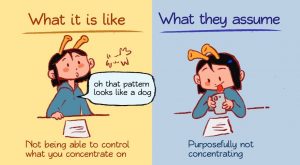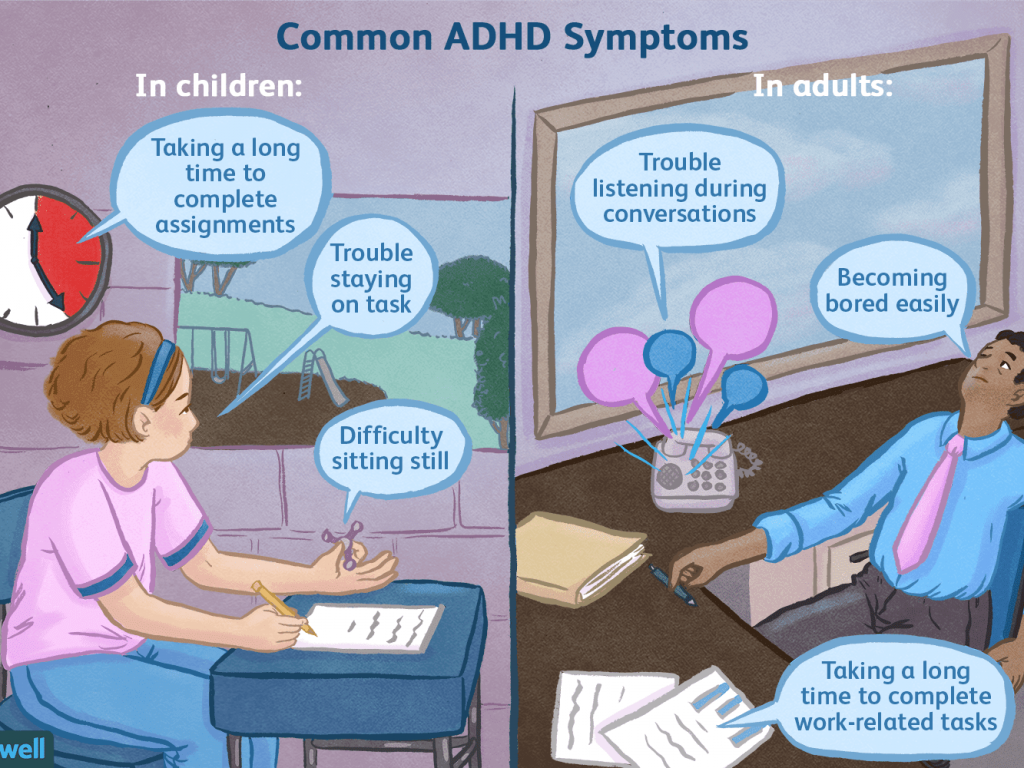
Treating ADHD – What You Need to Know About Children With ADHD
When it comes to treating ADHD in your child, there is a lot learn about the

Adult ADHD symptoms vary from person to person; each individual is unique and will have a different set of strengths and weaknesses than another adult with ADHD.
According to the Diagnostic and Statistical Manual of Mental Disorders (DSM-IV-TR) the essential adult ADHD symptoms are as follows:
Each individual will be unique, manifesting the above adult ADHD symptoms to a different degree. In no way are any of the above adult ADHD symptoms connected to an individual’s level of intelligence or amount of willpower; they reflect the characteristics of an actual condition.
One of the most prominent of adult ADHD symptoms is inattention – the inability to focus or stay on task. This is especially difficult in an environment where there is a lot going on around them; increased distractions codes for decreased attention. It is not uncommon for adults with ADHD to bounce from task to task without completing any of them, or skip necessary steps in procedures. Organizing time is similarly incredibly difficult for adults with ADHD; effective use of time is a real challenge, and appropriately managing time a weakness for the vast majority of adults with ADHD.
This is not to say that adults with ADHD can’t pay attention. Oftentimes when they are doing something that they enjoy or are involved in a conversation on a topic that they are interested in, they usually don’t have any trouble focusing. However, when the task is repetitive or boring, adults with ADHD will quickly lose interest and “zone out.”
While most adults tend to have “settled down” compared with their child counterparts, adults with displaying hyperactivity as an adult ADHD symptom are naturally quite active and always moving or on the go. They may attempt to accomplish several things at once, bouncing around from one activity to the next. Even when a situation forces them to sit still (business meeting, watching the evening news, family dinner around the table, etc.) their foot might start to tap, or their leg to shake or their fingers to drum. For an adult displaying hyperactivity as an adult ADHD symptom sitting still and being quiet is akin to torture, and is extremely difficult.
Impulsivity as an adult ADHD symptom often manifests itself as a problem with self-control. Adults with ADHD tend to censor themselves less than other individuals in general do. As such, their tendency is to interrupt conversations, invade other people’s space, ask irrelevant questions, make tactless observations, and ask overly personal questions. Having impulsivity as a symptom means there will also be the tendency to be moody and to overeat emotionally. Being patient or having to wait is extremely difficult for an adult with ADHD.
In order to qualify for an official diagnosis of ADHD, the following adult ADHD symptoms must be present:
- Often fails to give close attention to details or makes careless mistakes in schoolwork, work or other activities.
- Often has difficulty sustaining attention in tasks or play activity.
- Often does not seem to listen when spoken to directly.
- Often does not follow through on instructions and fails to finish schoolwork, chores or duties in the workplace (not due to oppositional behavior or failure to understand instructions).
- Often has difficulty organizing tasks and activities.
- Often avoids, dislikes, or is reluctant to engage in tasks that require sustained mental effort (such as schoolwork or homework).
- Often loses things necessary for tasks or activities (e.g., toys, school assignments, pencils, books or tools).
- Is often easily distracted by external stimuli.
- Is often forgetful in daily activities.
- Often fidgets with hands or feet or squirms in seat.
- Often leaves seat in the office or in other situations in which remaining seated is expected.
- Often experiences excessive feelings of restlessness.
- Often has difficulty playing or engaging in leisure activities quietly.
- Is often “on the go” or often acts as if “driven by a motor.”
- Often talks excessively.
- Often blurts out answers before questions have been completed, or interrupts conversations inappropriately.
- Often has difficulty awaiting one’s turn.
- Often interrupts or intrudes on others (e.g., cuts into conversations or games).
While only few individuals will manifest all of the above characteristics, most adults with ADHD will manifest some but not all of the adult ADHD symptoms. It is important to remember that each adult is an individual and is unique. The number of adult ADHD symptoms they display, and the extent to which these are displayed, will vary from person to person.
In addition to the negative effects and challenges associated with adult ADHD symptoms, there are also some positive aspects of the condition:
Always remember that ADHD is never due to a lack of intelligence or talent. On the contrary, many adults with ADHD are intellectually or artistically gifted.

When it comes to treating ADHD in your child, there is a lot learn about the
Medical Referral | Accident Attorney Referrals
Filter out the noise and nurture your inbox with health and wellness advice that’s inclusive and rooted in medical expertise.
MedicalReferral.com does not provide medical advice, diagnosis, or treatment.